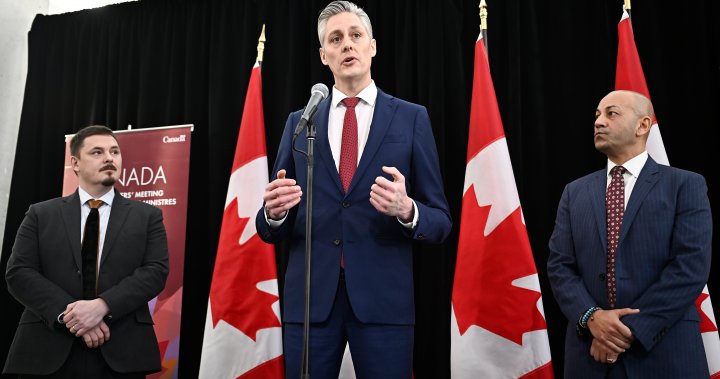Canada
Territorial premiers to talk Arctic policy in D.C. amid tariff threat

A United Front in Washington: Canadian Premiers Champion Northern Opportunities
Canadian premiers Ranj Pillai of Yukon, R.J. Simpson of the Northwest Territories, and P.J. Akeeagok of Nunavut converged in Washington to emphasize the significance of Northern Canada in strengthening continental security, fostering diplomacy, and unlocking economic potential. This critical mission comes as Canada navigates the challenges posed by threatened U.S. tariffs. The premiers are set to engage in a discussion at the prestigious Wilson Center, exploring avenues for Canada-U.S. collaboration in the Arctic. Their presence marks a historical moment, as all 13 Canadian premiers gathered in the U.S. capital for the first time, united in their diplomatic efforts against the tariffs introduced by U.S. President Donald Trump.
Navigating the Tariff Threat: A Complex Economic Landscape
The tariffs, signed into effect by President Trump, impose a 25% levy on steel and aluminum imports, including those from Canada, beginning March 12. This move followed a previous threat of broad tariffs on Canadian and Mexican goods, with a lower rate for Canadian energy exports. The tariffs are not just an economic challenge but also reflect Trump’s evident interest in Canada’s natural resources, hinted at by his remarks about the U.S. absorbing Canada and Greenland. This situation underscores the delicate balance Canada must strike in safeguarding its resources while maintaining a crucial economic partnership with its southern neighbor.
The Arctic’s Strategic Importance: A Region of Growing Global Interest
The Arctic, particularly Northern Canada, holds a strategic position in the discussion of continental security and economic opportunities. The region is rich in natural resources such as minerals and fossil fuels, which are pivotal to global markets. As the Arctic ice melts due to climate change, new shipping lanes are emerging, offering potential trade routes and enhancing the region’s geopolitical significance. The premiers aim to highlight the importance of responsible development and international cooperation in the Arctic, emphasizing collaboration over competition.
Science and Indigenous Knowledge: Partners in Arctic Progress
Central to the premiers’ discussions is the integration of scientific research and indigenous knowledge to guide sustainable development in the Arctic. The Arctic’s environmental uniqueness necessitates innovative solutions, leveraging both cutting-edge science and the traditional knowledge of indigenous communities. By fostering joint research initiatives with the U.S., Canada can address environmental challenges like climate change while exploring economic opportunities responsibly. This collaborative approach not only strengthens scientific ties but also ensures that the voices of Arctic residents are heard and valued.
Environmental Stewardship and Economic Growth: A Delicate Balance
The premiers’ message emphasizes the importance of balancing economic growth with environmental stewardship in the Arctic. As global demand for resources grows, the region’s fragile ecosystems must be protected. Canada’s approach to Arctic development is underpinned by strong environmental regulations and a commitment to reducing carbon emissions. By aligning economic growth with sustainability, Canada aims to set a global standard for responsible resource management, ensuring that the benefits of development are equitably shared while preserving the Arctic’s natural heritage.
Conclusion: A Vision for the Future of Canada-U.S. Relations
The visit of the Canadian premiers to Washington highlights the strategic importance of the Arctic in shaping the future of Canada-U.S. relations. By advocating for collaboration in areas such as resource development, environmental protection, and scientific research, the premiers aim to build a partnership rooted in mutual respect and shared goals. Addressing the challenges posed by tariffs while advancing a vision of sustainable development in the Arctic underscores Canada’s commitment to navigating the complexities of the 21st century with foresight and resilience. Through dialogue and cooperation, Canada and the U.S. can together unlock the immense potential of Northern Canada, securing a prosperous and sustainable future for generations to come.











